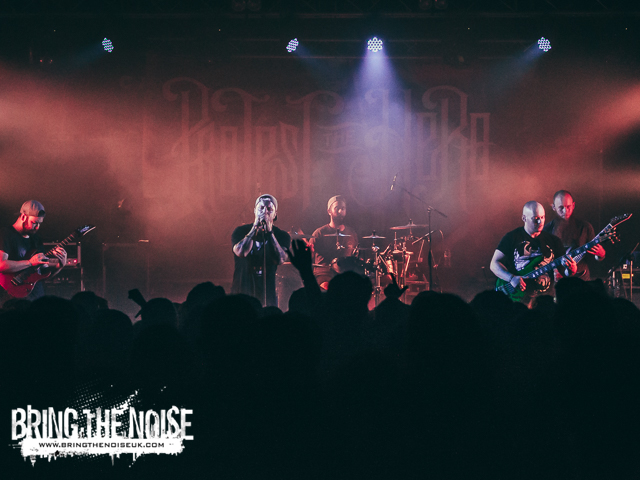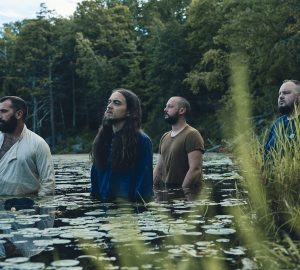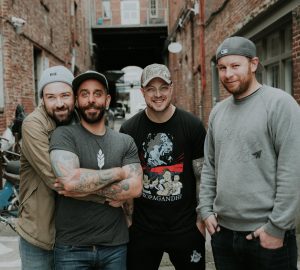Photo Credit: Julian Bailey
Canadian prog metallers Protest The Hero have made a name for themselves in recent years as industry trailblazers, having led a wildly successful crowdfunding campaign through Indie Go-Go for 2013’s Volition, and more recently with the their BandCamp subscription EP release, Pacific Myth. We caught up with guitarist Luke Hoskin at Tech-Fest to discuss the industry as it is today, the future of the band and more.
First of all, how are you today?
Can’t complain. In beautiful Newark, is that how you say it? There’s sheep to my left, trees to the right, and there’s a lot of loud, obnoxious music all around!
You guys have been pretty busy with Pacific Myth for the last six months or so. How far along in the process are you?
March 15th was the last song. Even now we’re waiting on final masters as we got it remixed and remastered, we realised the songs were all a separate mix so we wanted to make things more cohesive, then we’re going to actually release it to everything outside of BandCamp.
Retrospectively, how was the experience of creating Pacific Myth? Do you feel you’ve achieved what you set out to accomplish?
I think the best thing that was accomplished was that it really put a fire in our ass to write. Not that it’s the last priority but we’re just really slow when it comes to writing and because we had to promise people a song it helped us with the writing process to let stuff be and not overthink stuff. As we were running out of time we just had to go with our gut and be happy with what we came up with. I think some [of the songs] were better received than others but it was a really good way for us to test our fans, to test something new and force ourselves to try different ways of writing.
Because you were getting feedback from fans after every song, did you feel that you were tailoring forthcoming material to be in step with what had already been received well?
Well that was the interesting thing, I’ve never been in an environment where you can hear a final mix of a song, post it the next day and then get instantaneous feedback. You’ll put so much work into an album and then you put it out and people have so many opinions, whereas this was a smaller sample but you get feedback right away. Eventually in the last two songs we took some of the ideas that we were hearing, and not that they were writing the music for us, but it was really the first time we took what people wanted to hear and considered it.
We suppose that in an album situation it can be so insular and you’re not thinking so much about what everyone else wants…
Yeah, we always write for ourselves, but in the nature of how this came together it was nice that you could see feedback, and people would be like “we want this, we want that”, and as soon as we started integrating – we integrated piano in one song – and it was very simple piano, but it was crazy that people were blown away with that; I was kind of disappointed with my performance because it was just chording and stuff like that, but it was just really cool to see people respond to that.
Do you guys foresee more experimentation like that down the line?
Absolutely, we’ve just been touring with Between The Buried And Me and it’s really cool to see two of the guys with keyboards on stage and they’re able to fill out some parts, that would be something I’d love to do at some point.
Because of the often vast amount of time between writing an album, then recording, mixing, mastering before eventually releasing it, did you feel that the immediacy of this release gave you a stronger connection to the material on Pacific Myth?
Yeah, you never really have the chance to get comfortable with these songs, so people have probably listened to some of those songs more than I have by now. When you wait that two to three month period you kinda get tired and you’ve listened to it enough where you don’t really listen to it again. Whereas a lot of the stuff (on Pacific Myth) was learned and recorded and then not forgotten but it’s not the same, I have to revisit the songs to relearn them, and you feel more objective about it instead of criticising every little thing because it was very impulsive, so now it’s interesting to go back relistening to it and reworking things and getting familiar with it again.
How much did your new drummer Mike (Ieradi) contribute to Pacific Myth?
Mike is a writing machine, he almost writes too much, so we had to kinda trim the fat but it was just great to have all these ideas to pick from, when we hit a wall we could dig up some of his stuff and start trying it out and seeing what’ll work. The guy doesn’t have a shortage of ideas and he’s got an entirely different style so I think he tried to take influence from some of our old material but also puts his own flair on it.
You recently completed a 10th anniversary tour of Kezia, how did you connect with songs after all this time and how did the audience connect with them?
I think when I was relearning the songs there was a lot of “why did I ever think this was a good idea”, and that’s kind of the uniqueness of the song, but I was definitely an entirely different player then than I am now. It definitely brought back some stuff that maybe now if I approached those ideas I could inject some of that into the new material so it definitely made my revisit myself as an 18 year old kid writing guitar. It was also great to have Moe [Carlson, ex-drums] and Arif [Mirabdolbaghi, ex-bass] because we never really had a final last tour, and it was nice that people could come and see their last shows and we could kind of send them off in the proper way, so it was really nice to have those guys back and doing that, and it was well received and a great experience.
Do you see yourself doing that kind of tour with any of your other releases in the future?
I’m not going to say no, it’s kind of becoming a trendy thing, and it is a cash grab. I think the nice thing is people like knowing the set they’re going to see but it’s really hard for us to keep bringing them back. I like the idea of doing albums start to finish, but cashing in on the 10th/15th/20th anniversary, like what’s significant right? It’s fun to celebrate the songs but as long as you do it properly and people can finally see songs that they want to see it’s good for them.
Particularly with Pacific Myth and Volition before it you’ve released your music in pretty unique ways, what do you see yourselves doing next? Do you still want to go it alone or do you think you’ll work with a label again?
It’s interesting because I think people think we’re more independent than we are, and not that we’re faking that – we really stress an importance on pushing the standards that have been established in the music business. That being said, a traditional record contract could be in the artist’s favour. Now we can go to a label and say “here are our numbers, we’ve proven that you should invest in us,” and maybe we can flip it on its head. I was talking to the guys like “how much would we have to money would we have to get in a record advance to actually sign a crazy one-sided contract?” I can’t really think of it. Having and seeing our fans directly connect with us and how behind that people got and how inspiring that was, that’s more important to me than the campaign on its own. I think we’re all about empowering artists and trying alternatives. Not to say that there’s anything wrong with a traditional record contract or putting out a full length, we just wanted to try new things.
For us, I guess we see ourselves as role models and trying to encourage people that if you want to work for yourself you can do it, if you don’t want to do any work and you want to be strictly creative then you’re best off signing a record contract and having professionals do that, because a lot of record labels can do a way better job at distributing and selling albums than we can, but it’s funny when we can direct a small amount of people how much money is generated, and it’s surprising when you look at something like the Indie Go-Go or BandCamp. There’s only 8,000 people contributing, on Volition we sold maybe 50,000 records, so it’s not about how much money is being put in our pocket, but a small amount of people can generate a large amount of money.
In terms of new material, what’s next?
We have a pretty big break after this run, so hopefully it’s not going to be everyone going their own ways, and we’re going to schedule some writing time and we want to follow up with more material. How we’ll release that and what we’ll do is up in the air but we just want to write as much as we can, and we really kind of seeing certain bands that are turning around music very quickly, and we’re wondering how they’re doing it. We’re notoriously bad for being so in between but that’s been inspiring just to see people churning out albums – that’s the lifeblood of this business, without the music you wouldn’t have the tours so we’re going to try to focus on continuing to compose.
This is your first time at Tech-Fest, and this is the festival’s biggest year yet. Why do you think festivals like this are so important to the scene?
I think festivals in general are a good way to expose people to a lot of music in a short amount of time, and also in the summer time people want to get away from the city and relax and have fun.
Definitely, we also think by this point Tech-Fest is a pretty well oiled machine.
Yeah, and I think that’s the difference between the festivals that are successful and the festivals that fail is that they’re able to keep up with their growth. You want to keep the bands happy and I’ve been impressed with the treatment so far. We’ve played festivals where it’s like “there’s your tent, maybe we’ll find a case of water for you”, and it’s not to say we’re high maintenance but when you treat artists well and you pay them fairly they’re going to perform better and you build a reputation, it’s like a band – we’ve been at this for 16/17 years now and it’s not going to happen overnight but if people remember Tech-Fest then it’s going to continue to grow. I hope that they’re able to keep it going and I’m glad to hear that it’s selling more tickets, hopefully we can be back in a couple of years and it’s going to be even better.
Thanks for taking the time to chat to us!
Interview by: Josh Graham





